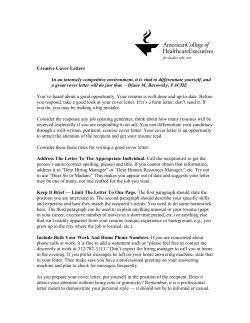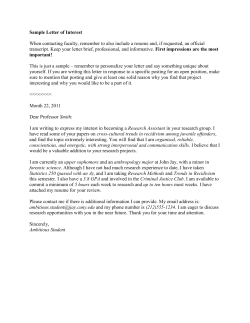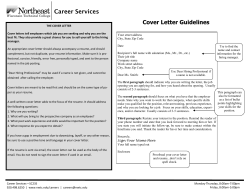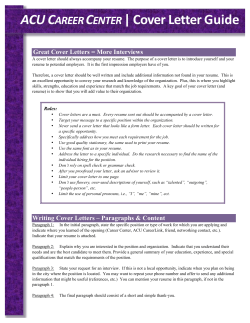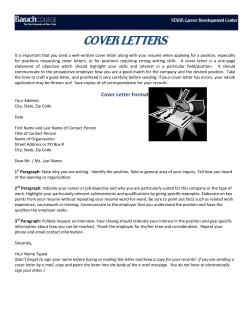
Document 196291
by Todd Waymon CAREERS How to Net Yourself a Job he next step in your career very well could come from a job advertised in cyberspace, rather than a newspaper or journal. For example, Cyndy Bresloff, a physicist who was dissatisfied with her position at a government laboratory, turned to the Internet in search of other prospects. It worked for her. By surfing cyberspace, she learned about, applied for, and obtained a job as an optical engineer at Tinsley Laboratories in Richmond, California. Although you probabl y use the Internet for electronic mail, file transfers, newsgroups, and research, you may not think of it as a jobsearching tool. Nevertheless, more and more employers are advertising job openings on the Internet. In addition, many services will post your resume on-line. Start your search engines To canvass the Internet for potential jobs, one of the best starting spots is a Web-based search engine—software that scours the Web for information that matches terms, phrases, or conditions that you provide. You will find a wide choice of such engines available, some of the most popular being AltaVista (http://altavista. digital. com/), Excite (http://www.excite.com/), Lycos (http://www.lycos.com/), and Yahoo! (http://www.yahoo.com/). Despite the variety of search engines available, they operate through roughly similar formats. For a simple start, you can just type in the words that describe the kind of information you are searching for, and most search engines allow you to connect them with standard “Boolean-logic” operators such as AND, OR, and NOT. To discover the grammar rules for a specific engine, look for a “Help” button. After you type in your terms, a search © 1996 American Institute of Physics engine returns a list of possible “hits”— sites on the Web that might relate to your interest. The list includes a brief summary of each hit and its address. By clicking on the address, your Web-browser software will take you to that site. These search engines can return lots of information on jobs in physics. If you use Excite to search for “physics + (jobs OR careers),” the search engine returns more than 150,000 hits. Using America Online’s “WebCrawler”—that service’s browser software—to search for “physics jobs,” you receive more than 35,000 hits. Even using Excite to search for “optics AND job” returns more than 8,000 Web addresses that may include relevant information. To reduce your hits to the more relevant ones, you should narrow your search terms. For example, if you use the Lycos search engine to find “(aeronautics OR aeronautical) + (physics OR physicist) + (job OR career),” you receive only 2,870 hits, but that is still a wealth of information. In most cases, you will get more hits than you would want to look over in one sitting. You could print out a list to review later. When you do scan them, many of your hits may not be job postings. Instead, some returned sites may be lists of sites that post 40 The Industrial Physicist jobs or even “Job Wanted” items. You can quickly reduce the size of your list by connecting to the most promising sites and browsing through them to see which ones you should explore further. By the way, turning off the images, which you can do in your Web-browser software, lets you move more quickly from one site to another. When you find a site that looks interesting, make a “Bookmark”—an optio n available in Web browsers that keeps a list of addresses, making it easy for you to return to a specific one— and then come back later for a more detailed examination of the material. Some employers also post jobs on Inter ne t news groups. Some of the most useful ones to check out are alt.jobs, alt.sci.physics, and s ci.physics. People even post their resumes in some newsgroups, i ncl udi ng us .job s.r esu mes and mi sc. jobs.resumes. Once you spot a specific job that you really want, respond by electronic mail with your best resume and a cover letter asking for the job. Several Web sites offer professional help in building a great resume. If you search for “resume writing,” you will get more than 3,000 hits to check. Cyber-headhunters Many on-line services list job openings and sometimes accept resumes for posting. A few of the largest include America’s Job Bank (http://www.ajb.dni.us), which lists 300,000 jobs, CareerPath (http://www. careerpath.com), which lists 136,000 jobs, OnLine Career Center ( h t t p : / / w w w . o c c . com), which lists 32,000 jobs and 27,000 resumes, and The Monster Board (http:// www.monster.com), which lists 15,000 jobs and 45,000 resumes. These sites include their own search engines, which can access job postings by industry or by location. You may be familiar with some of the services available from The American Institute of Physics (AIP). The Career Services Division’s World Wide Web site (http: // www.aip.org/careers/) posts job opportunities that it receives from industry, government, and academia. This information is provided free of charge to AIP members. In addition, AIP runs the “Careers in Physics Bulletin Board,” which is designed specifically for college students who are preparing for their first jobs in physics. This bulletin board features an interactive question-and-answer forum with six professional physicists each month. To participate contact Ed Goldin (csv@aip.org). Many employers find that subscribing to these services is very efficient and economical. In addition, job seekers love finding so many job postings available in one place. With these services, you can apply for a job as soon as you see it. Also, a very large job database, with detailed descriptions of the positions, helps you to make a more s elective search and to avoid so-call ed “spamming,” or plastering cyberspace with copies of your resume. You can focus on the jobs that you really want and avoid the temptation of applying for many back-up, or second-choice, jobs. The services that accept resumes will post yours for free. You simply send the service a plain-text version of your resume or even an HTML (hyper text markup language) page of your own. For a fee, some services will build a Web page to your specifications. To ensure an applicant’s confidentiality, these services usually offer “blind posting” of resumes— using a reference number rather than a name. If your resume attracts an employer’s attention, the employer contacts the service, which contacts you. Either a search engine or a career service may carry your next job search through cyberspace. On the Internet, the idea of networking to find a job has taken on a whole new meaning. Todd Waymon has degrees in physics and sociology and teaches computer science and applications at Montgomery College in Takoma Park, Maryland.
© Copyright 2025


